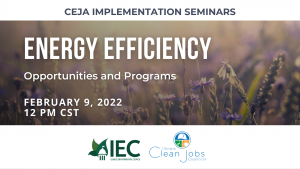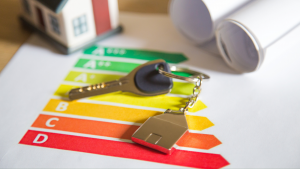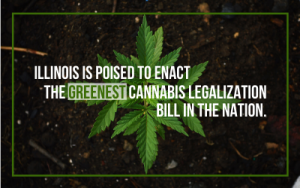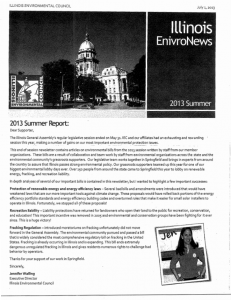Energy Efficiency
Using less energy for the same services

Renewable energy
Illinois is on track to get 25% of its renewables by 2025

energy efficiency
Consumers get the same services for less money

fossil fuels
Burning fossil fuels harms our health and environment

transportation
The transportation sector is now the largest carbon emitter
About Energy Efficiency
Current Energy Efficiency Laws
Beginning January 1, 2018, ComEd and Ameren’s energy efficiency targets will resume annual increases and will now be expressed in terms of cumulative persistent savings, which encourage utilities to pursue deeper, longer-lived efficiency measures:
- ComEd must achieve a 21.5% reduction in energy use by 2030 and Ameren a 16% reduction from eligible customers
- To achieve those long-term savings goals, ComEd must acquire new savings of between 2.0% and 2.5% of electricity sales every year – a higher level of savings than currently achieved by every state except Massachusetts and Rhode Island; Ameren will need to acquire between 1.5% and 2.0% new savings every year – comparable to a “top 10” state.
- Large usage customers with more than 10MW of demand are exempt from the utilities’ demand-side management programs after May 31, 2017.
- Customer savings from voltage optimization are now eligible to count toward the electric utilities’ goals; limited amounts of gas efficiency savings can also count under certain circumstances.
Energy Efficiency Programming
- Low-Income: A minimum of $33 million per year for programs targeting low-income households
- Local government and other public buildings: A minimum of 10% and 7% of ComEd and Ameren’s entire efficiency budgets, respectively, to fund efficiency measures for local government, municipalities, schools, public housing and community colleges
- Third Party: Over $33 million per year to fund competitively bid third-party energy efficiency programs beginning in 2019
Hardship Programs & Job Training
- ComEd will spend $50 million over five years on hardship programs, including those for low-income customers, seniors, and disabled veterans
- ComEd will invest $30 million to fund job training programs as follows:
- $3 million for solar training as a pipeline for the IL Solar Energy for All projects
- $3 million for a craft apprenticeship program
- $4 million for multi-cultural jobs programs
Read more about the energy efficiency provisions in FEJA by reading Elevate Energy’s summary here.
The Illinois Power Agency Act (IPAA) was enacted in 2007 and established the EERS. The EERS requires natural gas and electric utilities to reduce their annual energy energy rates and peak demand by:
- Reducing electric sales 2% by 2015 and holding at 2.0% every year thereafter;
- Implementing cost-effective measures to reduce demand peak by 0.1% over the prior year for a period of ten years for electric utilities;
- Requiring natural gas reach reductions of 1.5% by 2019 and increase by 1.5% each year thereafter.
Importantly, Illinois also created energy efficiency laws requiring the adoption of energy efficiency building codes. Read a list of these building codes here: Midwest Energy Efficiency Alliance – Illinois Building Codes
Illinois Energy Efficiency Updates
Energy Efficiency Opportunities & Programs
Join IEC and the Illinois Clean Jobs Coalition for a Lunch & Learn focused on the current landscape of energy efficiency in Illinois. This Lunch...
Read More >>Decarbonizing Your Home: Getting to Zero Net Carbon
Don't wait on leadership to act on climate-- here are some simple ways to start decarbonizing your own home!
Read More >>Energy Efficiency Policy: How laws can save you energy and money
For energy companies, the goal is to always sell more product – more energy – which usually means more dangerous emissions. Anne McKibbin of Elevate...
Read More >>Our Top Stay-at-Home Sustainability Tips
By Jen Walling | IEC Executive Director When so many of us are spending more time than usual at home due to the novel corona...
Read More >>Illinois Has the Greenest Cannabis Bill in the Country
With input from the environmental community, Illinois is about to become the national leader for environmental protection in the cannabis industry. Earlier this year, Governor...
Read More >>IEC EnviroNews (Summer 2013)
Find the full PDF online here or scroll down to read. Statehouse report List of upcoming events Recreation liability protection return to Illinois Progress on...
Read More >>





